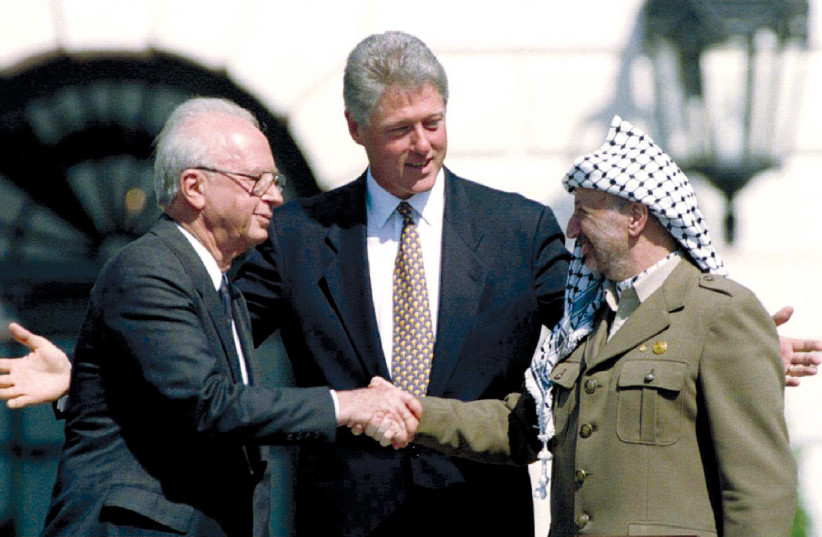Three fateful days in March 2002 constituted a “kind of grand-strategic crossroads,” writes author Yossi Alpher.
Those three 24-hour periods – which saw the horrific terrorist bombing of a Passover Seder in the Park Hotel in Netanya; the adoption of the Arab Peace Initiative on the following day, March 28; and the Israeli reconquest of the part of the West Bank under Palestinian rule on the day after – completely changed the status of Arab-Israeli and Israeli-Palestinian relations, notes Alpher in this well-written, meticulously researched and provocative book.
The strategic importance of this period is still underrated, he believes.
“Few scholars seem to have taken note that in late March 2002 the Arab states gave up on making war against Israel and the two-state solution died and that both those phenomena emerged in an interactive dynamic,” says Alpher, who served in the Mossad and as director of the Jaffee Center for Strategic Studies at Tel Aviv University. Currently, he is an analyst and author, writing about the Israeli-Palestinian conflict.
In the early 1980s, he also was a columnist for Newview magazine (Tel Aviv), for which I was a staff writer.

But immediately before those two history-changing events, a Palestinian terrorist carried out the gruesome Passover bombing, the worst such terrorist attack in Israeli history.
The planning of this mass murder bordered on the unbelievable.
The suicide bomber, Abd al-Basset Oudeh, entered Israel from the West Bank town of Tulkarm, 16 km. east of Netanya. Carrying forged credentials and dressed as a woman to avoid scrutiny at Israeli checkpoints, the Hamas agent had a suicide belt, with 10 kg. of explosives and shrapnel hidden underneath his blue jacket.
Incredibly, he had no specific target. His driver took him first to nearby Netanya. But because it was Passover eve, there weren’t many people on the streets so the two drove to Tel Aviv searching for a better target. Seeing the same situation there, they returned to Netanya and eventually found the modest Park Hotel, which was hosting a Seder.
Oudeh eluded the guard who was checking incoming guests. He positioned himself between tables nine and 10 in the hotel banquet hall and detonated his bomb.
“The explosion was deafening,” the author writes. “Ball bearings and metal shrapnel flew in all directions. Human beings and furniture were transported by the blast across the banquet hall. People were shredded. Body parts were severed. Blood flowed. Ears were ringing. Smoke and dust enveloped the dining hall and the lobby, briefly limiting visibility to barely a meter.”
This outrage – the worst of what had been a recent series of murderous bombings by Palestinians – helped convince most Israelis that their neighbors were more interested in killing them than in making peace. As such, it helped destroy the Oslo process as well as Israel’s political Left, the staunchest advocates for peace.
The Park Hotel bombing also led to the construction of the barrier – part fence, part wall – between the West Bank and Israel, which, before the terrorist attack, former prime minister Ariel Sharon and many others on the Right opposed.
And then, says Alpher, the end of the peace process was ushered in two days later when the IDF carried out Mivtsa Homat Magen (Operation Defensive Shield), the invasion of the PA’s territory on the West Bank. It was designed so that Israeli forces could capture weapons, ammunition and terrorists.
“Israel erased anything resembling genuine Palestinian security autonomy in Area A, that one-quarter of the West Bank ostensibly under total Palestinian Authority control,” Alpher notes.
(Israeli troops withdrew from Ramallah, the last part of the land it had reoccupied in Operation Defensive Shield, in 2003.)
In the cabinet vote authorizing the operation, then-foreign minister Shimon Peres, architect of the Oslo Process, abstained, fearing its effects on his diplomatic triumph. The author writes, “Regardless of the merits and justice of Defensive Shield, Peres’s fears were justified: Oslo never recovered and international condemnation of Israel’s tactics was extensive.”
Bookended by those two political and strategic bombshells was a meeting of Arab leaders in Beirut. The Arab League summit issued the Arab Peace Initiative, which offered Israel peace and normalized relations with the Arab world in exchange for Israeli withdrawal to pre-1967 borders.
The API’s unfortunate timing – as well as the Arab leaders’ insistence that the document was a take-it-or-leave-it offer, not the opening in negotiations – doomed the effort.
But its strategic meaning was enormous. In March 2002 writes Alpher, the Arab states “gave up on making war against Israel and the two-state solution died… ”
It “was momentous not because it catalyzed or generated Arab-Israeli peace but because it accepted Israel.”
Today, Israel controls “what increasingly looks like a one-state reality between the Jordan River and the Mediterranean Sea,” according to the author.
That leaves three possible outcomes: a binational or apartheid state or a hybrid of the two. Alpher says.
Let’s hope there is another, more palatable option, for a binational state would mean ending the Jewish state by definition; an apartheid version could unite the world in a hostile alliance against Israel – as it did in the case of South Africa – tempting its enemies to use political, economic and even military force to destroy her.
In either case, it would be a bitter end to the 2,000-year-old dream of the Jewish people’s revival in its ancient homeland. ■
The writer’s memoir, Figs and Alligators: An American Immigrant’s Life in Israel in the 1970s and 1980s (Chickadee Prince Books) can be purchased online.
Death Tango
By Yossi Alpher
Rowman & Littlefield
220 pages; $36
